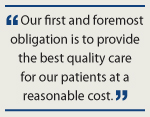I read “Are Clinical Pathways Inevitable in Oncology’s Future?” (The ASCO Post, July 15, 2011) including Lesli Lord’s interview with great interest and agree with most everything said in the article. However, I do want to make one comment: There is no specialty for which the 80/20 rule applies more than it does in oncology—that is, pathway recommendations may work for the majority of patients, but perhaps 20% of patients will be best served by using therapy that is divergent from these accepted pathways.
 Pathways and standards of care are useful and will reduce cost eventually while likely improving the quality of care. However, I have been in practice for close to 30 years and have learned the importance of “thinking outside the box.” I have had major successes with drugs that were not considered to be the standard of care for patients who I thought were appropriate candidates for such treatment.
Pathways and standards of care are useful and will reduce cost eventually while likely improving the quality of care. However, I have been in practice for close to 30 years and have learned the importance of “thinking outside the box.” I have had major successes with drugs that were not considered to be the standard of care for patients who I thought were appropriate candidates for such treatment.
I understand that reimbursement is a major issue in the current economic climate. I also concede that pathway development is ongoing, evolving, and will generally be a good thing. Nevertheless, I would like to see those of us who attempt to advocate for patients and think outside the box be given some recourse to treat our patients discordant with pathways on occasion, and when and if the physician feels strongly about the need to treat a patient differently.
As always, our first and foremost obligation is to provide the best quality care for our patients at a reasonable cost; hopefully, we won’t lose sight of the first concept while concentrating on the second. After all, if all we needed were pathways to decide on clinical treatments, we might as well just slip them into a computer with the patient’s record and go fishing. ■
—Stephen C. Fox, MD, FACP
Paoli, Pennsylvania

